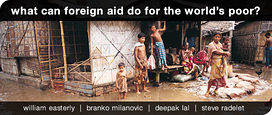There are two additional points I would like to make regarding aid. First: we all are concerned (upset, unhappy) about the fact that aid is not efficient as it could be. The minimum that aid should accomplish however is to ensure progressive transfers at the global level. This means that aid money should flow from people who are richer to people who are poorer. This is also the minimum one expects within individual nations: welfare benefits should help people who are poorer than the taxpayers who finance these benefits. What can we say about aid in that regard? Consider the following fact.
The random dollar (since we do not know what exact dollar is used to finance aid vs. other government spending; nor does it matter since money is fungible) that is used to finance US aid comes from people who are in the 91st percentile of US income distribution. Now, these people have a net or disposable income of about $33,000 per person per year. (For those who are used to thinking about household net income, that means that this household, assuming a family of four, has about $130,000 in net terms, or more than $200,000 before taxes.) Now, the question is, how likely is it that these tax dollars will end up in the pockets of somebody richer than the US taxpayer? The answer is, very unlikely. Even in the middle-income countries with high income inequality, like Brazil, there are fewer than 2 percent of people whose income is higher than $33,000 per person per year. (All these are calculations based on the data from my book Worlds Apart, Princeton University Press, 2005.) For other countries that are poorer or have more equal income distributions, there are even fewer people with such high incomes and the likelihood of a regressive transfer is even less, almost minimal. The bottom line is this: regressive transfers at the global legal are quite unlikely, unless one is willing to argue that the benefits of aid are appropriated only by the very, very top of the income pyramid in poor countries. This is not impossible but is not probable.
Second: should we do perhaps things radically differently? Yes, I think we should. Assume for the moment that the world is a global community with a single government. What would such a government do? It would probably have an agency like US Department of Health and Welfare that would try to target transfers to the truly poor. Obviously, at the world level, solidarity between people living in different countries is less than the solidarity (and willingness to transfer money) between people who live in the same country, but it is not nil either. A global welfare agency could be financed by a tax paid by the rich people in rich countries (such as a small tax on air transport, or financial transactions or any other luxury good with high income elasticity). The agency would then disburse that money, in cash, to the poor people in poor countries directly rather than having to go, as now, through their governments in order to reach them.
This change would take care of the major cause of aid leakage: governments, and other agencies, intermediation which often result in useless projects. If a global aid agency can deal directly with poor people and give them aid in cash, there would be no leakage at all, except for possible mistargeting, i.e. giving cash to the people who are not poor. But such mistargeting is rather unlikely: it would be quasi-impossible to argue that, say in Zimbabwe, cash aid should go to government employees rather than to the children of illiterate farmers. On the other hand, mistargeting is much easier to conceal under the current system where one deals with governments and large projects: who can really compare benefits of a new school with those of a
factory that may (or may not) employ several hundred people? By delivering aid in cash, we do not tell poor people what they should do (go to school or get a job in a factory), and how they should spend their money. We just allow them to decide, without paternalism, on their own. And we improve, ever slightly, their condition.
Note finally that a global welfare agency introduces a similarity in its treatment of poor and rich countries. Yes, some of the national prerogatives of tax-raising power would be lost by the rich countries, but similarly some of the poor countries’ sovereignty would be lost in the process as well. Poor countries’ governments would not have to agree to a particular transfer. The global welfare agency would deal with poor people directly, whether poor countries’ governments like it or not. (More on this idea can also be found in my book quoted above.)

